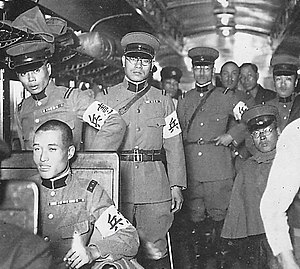Japanese secret police
| Kenpeitai 憲兵隊 |
|
|---|---|

Kenpei officers aboard a train in 1935.
|
|
| Active | 1881–1945 |
| Disbanded | August 1945 |
| Country |
|
| Branch |
|
| Type | Gendarmerie |
| Role | Various duties including judicial, counterinsurgency and military roles |
| Size | 7,500 (c.1945) |
| Part of |
Home Ministry (within Japanese home islands) Ministry of War (overseas territories) |
The Kenpeitai (憲兵隊, "Military Police Corps") /kɛmpeɪˈtaɪ/ was the military police arm of the Imperial Japanese Army from 1881 to 1945. It was not a conventional military police, but more of a secret police.
While it was institutionally part of the Imperial Japanese Army, it also discharged the functions of the military police for the Imperial Japanese Navy under the direction of the Admiralty Minister (although the IJN had its own much smaller Tokkeitai), those of the executive police under the direction of the Interior Minister, and those of the judicial police under the direction of the Justice Minister. A member of the corps was called a kenpei.
The Kenpeitai was established in 1881 by a decree called the Kenpei Ordinance (憲兵条例), figuratively "articles concerning gendarmes". Its model was the Gendarmerie of France. Details of the Kenpeitai's military, executive, and judicial police functions were defined by the Kenpei Rei of 1898, which was amended twenty-six times before Japan's defeat in August 1945.
The force initially consisted of 349 men. The enforcement of the new conscription legislation was an important part of their duty, due to resistance from peasant families. The Kenpeitai's general affairs branch was in charge of the force's policy, personnel management, internal discipline, as well as communication with the Ministries of the Admiralty, the Interior, and Justice. The operation branch was in charge of the distribution of military police units within the army, general public security and intelligence.
...
Wikipedia
